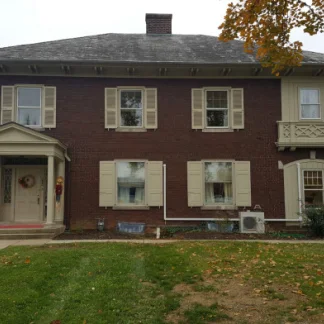Youth Advocate Programs
Youth Advocate Programs is a private rehab located in York, Pennsylvania. Youth ...
Colonial House - Female Facility offers inpatient treatment for individuals with alcohol and/or substance addiction. The program includes 12-step programs, family education, group therapy and more. Colonial House - Female Facility is located at York, Pennsylvania.
Colonial House – Female Facility’s 90 day program is designed to aid chemically dependent people who require more time and structure to develop the skills and resources necessary to maintain recovery. A full treatment schedule consists of daily group therapy, individual counseling, family consults, lectures and workshops, and relapse prevention.
Clients attend Alcoholics or Narcotics Anonymous meetings daily and are given the opportunity to begin practicing 12 step recovery & work through the stumbling blocks of early recovery, while still in a structured counseling environment.
Colonial House creates a stable, nurturing environment, which is conducive to, not only, allowing each client to develop healthy, productive, drug free lives, but also to assist them in acquiring the skills to achieve sobriety and maintain a chemical free lifestyle. In order to maintain a chemical free lifestyle, we believe in guiding our clients through each and every step to becoming clean and sober.
Contact us for more information: (717) 792-9702

Connect with Colonial House - Female Facility by calling their admissions team directly.
(717) 792-9702 Website Get DirectionsResearch clearly demonstrates that recovery is far more successful and sustainable when loved ones like family members participate in rehab and substance abuse treatment. Genetic factors may be at play when it comes to drug and alcohol addiction, as well as mental health issues. Family dynamics often play a critical role in addiction triggers, and if properly educated, family members can be a strong source of support when it comes to rehabilitation.
Group therapy is any therapeutic work that happens in a group (not one-on-one). There are a number of different group therapy modalities, including support groups, experiential therapy, psycho-education, and more. Group therapy involves treatment as well as processing interaction between group members.
In individual therapy, a patient meets one-on-one with a trained psychologist or counselor. Therapy is a pivotal part of effective substance abuse treatment, as it often covers root causes of addiction, including challenges faced by the patient in their social, family, and work/school life.
Life skills trainings involve all the skills a person must have in order to function successfully in the world. These include time management, career guidance, money management, and effective communication. Truly successful addiction recovery is based on the ability to not only live substance-free, but to thrive. Life skills teaches the practical necessities of functioning in society, which sets clients up for success in life, and therefore sobriety.
Group therapy is any therapeutic work that happens in a group (not one-on-one). There are a number of different group therapy modalities, including support groups, experiential therapy, psycho-education, and more. Group therapy involves treatment as well as processing interaction between group members.
In individual therapy, a patient meets one-on-one with a trained psychologist or counselor. Therapy is a pivotal part of effective substance abuse treatment, as it often covers root causes of addiction, including challenges faced by the patient in their social, family, and work/school life.
Life skills trainings involve all the skills a person must have in order to function successfully in the world. These include time management, career guidance, money management, and effective communication. Truly successful addiction recovery is based on the ability to not only live substance-free, but to thrive. Life skills teaches the practical necessities of functioning in society, which sets clients up for success in life, and therefore sobriety.
In individual therapy, a patient meets one-on-one with a trained psychologist or counselor. Therapy is a pivotal part of effective substance abuse treatment, as it often covers root causes of addiction, including challenges faced by the patient in their social, family, and work/school life.
Life skills trainings involve all the skills a person must have in order to function successfully in the world. These include time management, career guidance, money management, and effective communication. Truly successful addiction recovery is based on the ability to not only live substance-free, but to thrive. Life skills teaches the practical necessities of functioning in society, which sets clients up for success in life, and therefore sobriety.
Life skills trainings involve all the skills a person must have in order to function successfully in the world. These include time management, career guidance, money management, and effective communication. Truly successful addiction recovery is based on the ability to not only live substance-free, but to thrive. Life skills teaches the practical necessities of functioning in society, which sets clients up for success in life, and therefore sobriety.
Youth Advocate Programs is a private rehab located in York, Pennsylvania. Youth ...
New Insights II is a private, traditional rehab located in York, Pennsylvania. N...
TW Ponessa and Associated Counseling Services – Philadelphia Street is a private...
Madison House East is a private rehab located in York, Pennsylvania. Madison Hou...